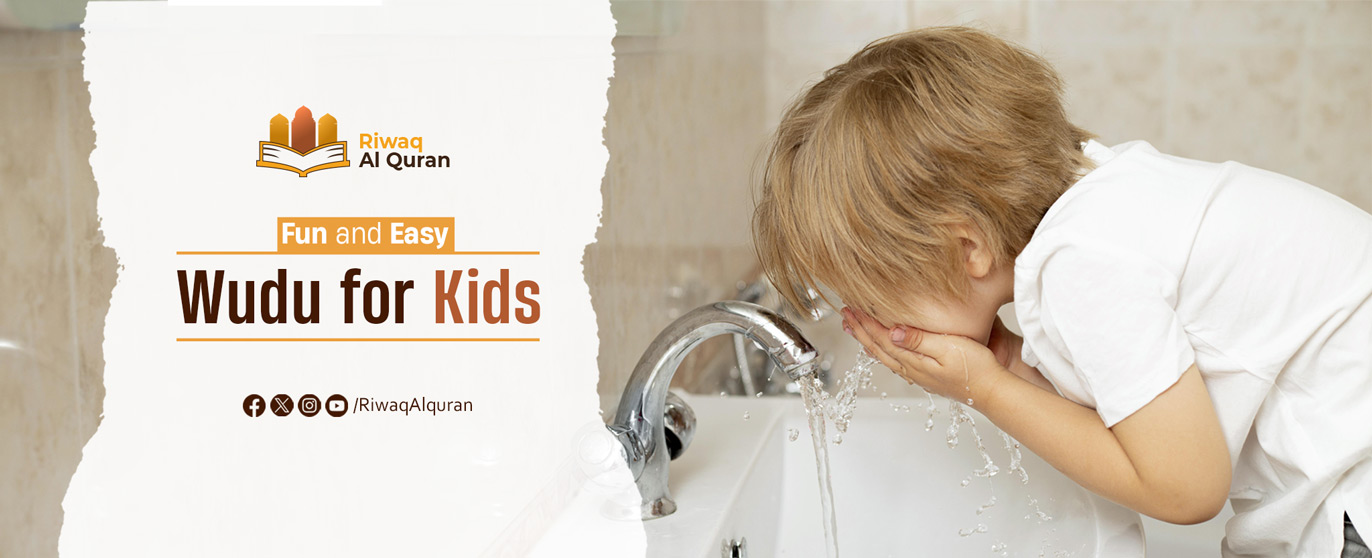Wudu For kids involves several steps: starting with the intention (niyyah), washing hands and face, rinsing mouth and nose, washing arms, wiping the head, cleaning behind the ears, and washing feet.
Each step is performed with care and repeated three times to ensure thorough cleansing. Wudu promotes both physical hygiene and spiritual readiness for prayer, fostering discipline, routine, and a sense of cultural identity within the Muslim community.
Through patient guidance and regular practice, children develop a lifelong respect and understanding of this essential ritual.
Teaching kids about wudu (ablution) is essential for helping them understand the importance of cleanliness and preparation for prayer in Islam. Here’s an easy and fun way to guide your children through the steps of wudu.
Table of Contents
Wudu For Kids
Wudu, or ablution, is an important Islamic practice that teaches children the significance of cleanliness and preparation for prayer. Wudu is a ritual cleansing performed by Muslims before prayer.
Wudu involves purifying specific parts of the body with clean water, symbolizing both physical cleanliness and spiritual preparation to stand before Allah. Wudu is a fundamental practice that underscores the importance of purity and reverence in Islamic worship, helping believers maintain a state of ritual purity necessary for prayer.
Why Patience is Important When Teaching Wudu to Kids
Teaching wudu (ablution) to kids requires patience for several reasons:
- Learning Curve: Kids are learning a new routine that involves several steps. It takes time for them to remember and perform each step correctly.
- Encouragement: Patience allows parents and educators to encourage kids positively, making the learning process enjoyable rather than stressful.
- Mistakes as Learning Opportunities: Children will make mistakes, and patience helps in gently correcting them without discouraging their efforts.
- Building Habits: Consistent, patient teaching helps children develop a lifelong habit of performing wudu correctly and with understanding.
Patience is key to ensuring that kids learn wudu correctly and develop a lifelong love and respect for this important practice.


The most important reasons for Teaching kids wudu?
- Religious Obligation: Wudu is a fundamental part of Islamic practice, necessary for performing prayers correctly.
- Hygiene: It promotes cleanliness, teaching children the importance of maintaining physical purity.
- Spiritual Preparation: It helps children prepare spiritually for prayer, fostering a sense of connection with Allah.
- Routine and Discipline: Regular practice of wudu instills a sense of routine and discipline, which are valuable life skills.
- Cultural Identity: Understanding and practicing wudu helps children feel a part of the Muslim community and heritage.
By being patient and supportive, we ensure that children learn this important ritual with a positive attitude and thorough understanding.
The Importance of Ritual Purity in Islam
Ritual purity, or Tahara, is a fundamental aspect of Islam, symbolizing both physical and spiritual cleanliness. It prepares Muslims to stand before Allah in prayer with a pure heart and body.
Experience Riwaq Al Quran Classes
Watch real moments from our live sessions at Riwaq Al Quran and see how we bring learning to life. These clips highlight our interactive, student-focused approach designed to keep learners engaged, motivated, and actively involved in every step of their educational journey.
Wudu Steps For Kids
Begin with the intention (niyyah) for purity. Wash hands three times, alternating between right and left. Rinse mouth and nose three times each. Wash face three times, from ear to ear and hairline to chin. Clean lower arms up to elbows three times. Gently wipe the entire head once with wet hands. Clean behind ears with thumb once. Wash feet up to ankles, ensuring water between toes, three times per foot, starting with the right.
1. Intention (Niyyah):
Begin by making the intention in your heart to perform wudu for the sake of Allah and say Bishmillah.
2. Washing Hands:
Use your left hand to wash your right hand. Do this three times. After that, use your right hand to wash your left hand three times. Make sure to wash in between your fingers and up to your wrists.
3. Mouth Rinsing:
Use your right hand to cup water into your mouth three times. Swish it around in your cheeks. Do this thoroughly.
4. Nose Cleansing:
Use your right hand to cup water inhale it into your nose and blow out three times. Snort sharply and abruptly without taking too much water into your nose and choking yourself. If you cannot inhale water into your nose, you can wet your fingers and put water on the lower part of your nostrils.
5. Face Washing:
Wash your face three times by spreading your hands from your right ear to the left, and from the hairline to the chin.
6. Washing Arms:
Wash your lower arms from wrists to elbows, leaving no part dry. From your wrist to your elbow, wash your right arm with your left hand three times and then wash your left arm with your right hand three times.
7. Wiping Head:
This is known as “maseh”. Using your wet hands, gently wipe the entire head once, from the forehead to the back of the head, and wipe it again forward from the back of the head to the forehead.
8. Ears Cleaning:
Use your thumb to clean behind your ears from the bottom upward. This is also done one time.
9. Washing Feet:
Clean up to the ankles and be sure water goes between the toes. Use your pinky finger and go through each toe to eliminate anything between. Start with your right foot and scrub each foot three times.
Read more about Salat for Kids: How to Teach a Child to Pray In Islam?
Tips for Helping Kids Avoid Errors
Here are some tips:
- Make it Fun: Turn wudu into a fun activity by singing songs or using rhymes.
- Be Patient: Gently correct mistakes and praise their efforts.
- Lead by Example: Perform wudu together and let them mimic your actions.
- Missing parts of the face or arms.
- Not washing each part three times.
- Rushing through the steps Encourage kids to take their time and ensure each step is performed correctly.
By making wudu a regular part of their routine, kids will learn to appreciate its importance in their daily prayers.
Kids Maybe ask about:
What is Wudu?
Wudu is the Islamic procedure for washing parts of the body before prayers.
Why do we perform Wudu?
We perform wudu to cleanse ourselves physically and spiritually before standing in prayer.
What body parts do we need to wash during Wudu?
Hands, mouth, nose, face, arms, head, ears, and feet.
Why do we wash each body part three times during Wudu?
Washing each part three times ensures thorough cleansing.
Can we perform Wudu with dirty water?
No, wudu must be performed with clean, pure water.
What should we do if we make a mistake during Wudu?
If a mistake is made, correct it and continue from where you left off.
Can we perform Wudu if we don’t have access to water?
If water is unavailable, tayammum (dry ablution) can be performed using clean soil or dust.
How often do we need to perform Wudu?
Wudu should be performed before each of the five daily prayers and after activities that invalidate it (e.g., using the bathroom, or deep sleep).
Read more about: What Breaks Wudu? Full Guide


Why Students Love Learning with Riwaq Al Quran
Hear directly from our students about how Riwaq Al Quran Academy has transformed their connection with the Book of Allah. Their experiences reflect the dedication, care, and quality that guide every step of our teaching.
Learn Quran, Arabic, And Islamic Studies Online With The Best Native Tutors
Riwaq Al Quran is a comprehensive online platform that offers personalized Quran, Arabic and Islamic Studies Online classes for individuals of all ages and backgrounds.
Their experienced instructors use a structured curriculum to cover Tajweed, Tafsir, and Memorization, providing easy and effective access to learning the Quran.
The advanced online classes allow for seamless communication and interaction between students and teachers. Join Riwaq Al Quran for a deeper connection with the Quran.
We offer several courses such as:
- Online courses for kids.
- Online Quran classes for kids and adults.
- Online Arabic courses
- Online Ijazah courses
- Online Islamic Studies courses.
Here are a sample of our set of Quran Courses that will be helpful for you:
- Online Tafseer Course: Delve into Quranic meanings with our insightful online Tafseer course.
- Noorani Qaida Online: Learn Quranic basics efficiently through our Noorani Qaida online program.
- Online Quran Recitation Course: Enhance Quranic recitation skills through our expert-led online course.
- Online Tajweed Classes: Master Tajweed rules for beautiful Quranic recitation in online classes.
- Quran Memorization Online Course: Memorize the Quran effectively with our specialized online memorization course.
- Online Qirat Course: Explore diverse Qirat styles with our comprehensive online Qirat course.
- Online Quran Classes for Kids: Nurture a love for the Quran in kids through interactive online classes.
Conclusion
Wudu is a beautiful practice that teaches children the value of cleanliness and purity. By following these simple steps and incorporating them into their daily routine, kids can develop a strong foundation for their spiritual journey.
Teaching kids about wudu (ablution) is crucial for instilling the importance of cleanliness and preparation for prayer in Islam. Patience is essential when teaching wudu to children due to their learning curve and the need for encouragement and correction without discouraging them.
Wudu serves multiple purposes: it fulfills a religious obligation, promotes hygiene, prepares children spiritually for prayer, instills routine and discipline, and connects them to their cultural identity.
By teaching wudu patiently and supportively, children develop a lifelong habit that emphasizes both physical and spiritual purity, preparing them to approach prayer with reverence and sincerity.


































